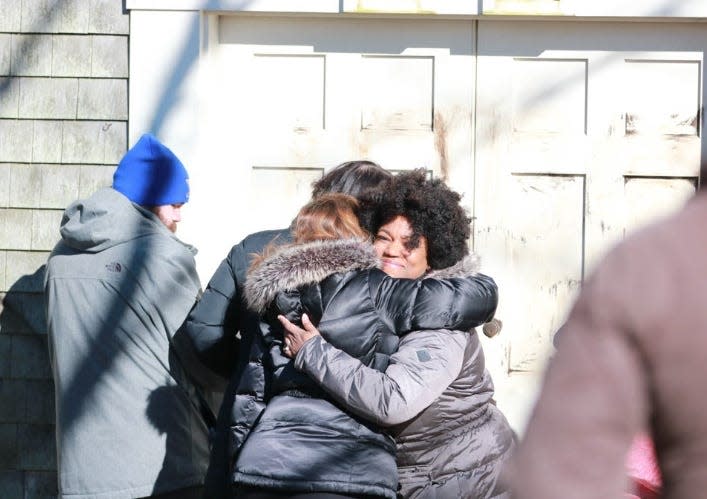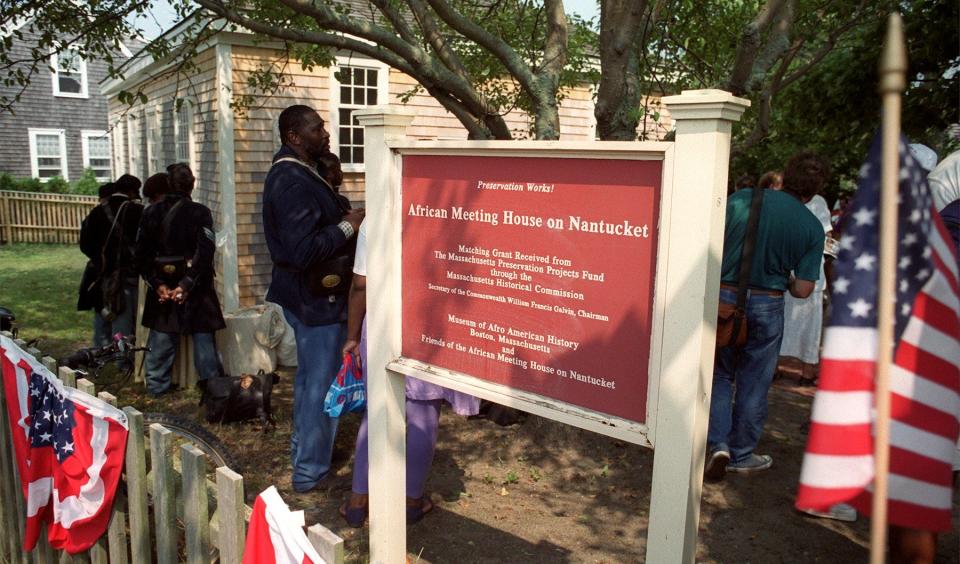Judge rules in racist graffiti at Nantucket's African Meeting House civil rights lawsuit
NANTUCKET — Nantucket Superior Court judge ruled Monday that island resident Dylan Ponce was responsible for the 2018 racist and sexually explicit graffiti left on Nantucket’s African Meeting House.
In a civil rights lawsuit, Judge Mark Gildea ruled that Ponce violated the civil rights of the plaintiffs through the “plainly intimidating” racist and graphic graffiti left on the Meeting House.
The suit was filed by Nantucket residents Jim Barros and Rose Marie Samuels.
Read the full ruling here: James Barros and Rose Marie Samuels v. Dylan Ponce
Gildea issued a permanent injunction against Ponce, 26, mandating that he stay away from the African Meeting House, keep a distance of at least 25 yards from Barros and Samuels in public and have no contact with the two.
The background on the African Meeting House case
Sometime in the night of March 10-11, 2018, Ponce spray-painted the phrase “N****rs Leave!” on the Meeting House door, according to Gildea’s decision.
The next day, Ponce told his employer, Jeffrey Sayle, 52, about the crime.
Sayle said Ponce “bragged” to him about spray-painting the church, even telling him where the spray-paint can was hidden in Ponce’s apartment. In his deposition, Sayle said he took the can from Ponce’s apartment and hid it in his pickup truck, Gildea’s decision reads.

About a year after the 2018 incident, Sayle said Ponce “bragged” to him once again about the crime.
Sayle was indicted in October 2020 by a statewide grand jury on charges of misleading the investigation into the 2018 hate crime. He pleaded guilty in March 2021 on a charge of reporting a false crime in connection with the incident.
Judge Douglas Wilkins sentenced Sayle to one year and six months’ probation, a $900 fine for probation supervision fees, $50 in victim, witness assessment fees as well as 100 hours of community service and one-on-one evaluation with a social worker regarding racial sensitivity.
Sayle was the only individual indicted by the grand jury, Gildea indicated in the decision.
A grand jury subpoenaed Ponce, who was identified by the Cape and Islands District Attorney’s Office as the target of the investigation, but he declined to testify, citing the Fifth Amendment.
No indictments were brought against Ponce and he has not been charged criminally in connection with the 2018 incident.
The importance of the African Meeting House
Built in 1825 by the African Baptist Society, the African Meeting House is Nantucket’s only still-standing public building constructed and occupied by Black residents from the 19th century, Gildea’s ruling reads.
The Meeting House is a museum, a stop on the Museum of African American History’s “Nantucket Black Heritage Trail” and is one of America’s oldest African American churches still in use.
The 2018 racist graffiti has eroded Barros and Samuels’ sense of safety in their community, Gildea ruled.
“Mr. Ponce’s racist act struck fear in both Mr. Barros and Ms. Samuels for themselves and their families. It caused both Plaintiffs to fear reasonably using public ways and public accommodations around the island of Nantucket, particularly after dark,” the ruling says. “The racist graffiti used by Mr. Ponce also constituted an implicit threat…Painting that phrase on that building was intended by Mr. Ponce to make Blacks on Nantucket fearful or apprehensive of injury or harm if they stayed.”

Boston attorney John Hitt, who represented Barros and Samuels, said he is pleased with the court’s ruling
“Ponce’s racist actions have no place in a civilized society,” Hitt said in an emailed statement to the Times. “Mr. Barros and Ms. Samuels have taken an important stand against Ponce’s racist acts. Today, a measure of justice has been achieved.”
In a separate 2021 civil case, Barros and Samuel allege that Nantucket’s Select Board, the town administrator and the chief of police “muzzled” them after inquiring into the 2018 hate crime investigation. That case remains pending in Nantucket Superior Court.
Boston attorney James Merberg, Ponce’s lawyer, did not immediately respond to a request for comment.
This article originally appeared on Cape Cod Times: Ponce found responsible in Nantucket's African Meeting House lawsuit

